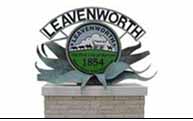
Continue west
on Kiowa to Seventh Street, then turn right and proceed north
to the main gate of Fort Leavenworth.

The fort was
established in 1827 by Colonel Henry Leavenworth and a battalion
of his 3rd Infantry Regiment. It is the oldest Fort west of the
Mississippi River that has never had a break in its active duty
status since the day of its founding. Today the fort is the home
of the U.S. Army Combined Arms Command.

Fort Leavenworth
oversees training and combat development for the Army and is the
home of the U.S. Army Command and General Staff College.

Traveling
north on Grant Avenue into the fort will be the Buffalo Soldier
Monument located immediately after the second stop light on the
right. This magnificent monument was dedicated in July 1992. This
project was initiated by General Colin Powell. While stationed
at the fort, General Powell noted that only two short streets
were named after the 9th and 10th Cavalry Regiments comprised
of black soldiers. A fund-raising project was initiated in the
late 1980's and, over one million dollars later the monument was
installed.

The Buffalo
Soldiers proved their bravery and valor throughout the Indian
Wars. They won the respect of the Cheyenne warriors who named
them "Buffalo Soldiers," a badge of honor accepted and
worn with pride. This beautiful monument is indeed a fitting tribute
to these black cavalry troopers. At this time drive on through
the parking lot and turn left on Stimson and then right on Bundel
Road to view the Berlin Wall Monument located in the Grove of
Regiments.

Return to
Grant to continue north to the next stop light which is Reynolds
Avenue and take a right to the Frontier Army Museum. The museum
is open Monday - Friday 9 a.m. to 4 p.m.; Saturday, 10 a.m. to
4 p.m. and from 12 noon to 4 p.m. on Sundays and holidays (closed
Easter, Thanksgiving, Christmas and New Years). Donations accepted.
You may follow the Fort's Historic Wayside Tour from this location.

As you leave
the main gate of the fort, turn right and drive west on Metropolitan.
This road will take you by the U.S. Federal Penitentiary. Construction
of the prison was begun in 1895 and was built with prison labor.
The first inmates were housed after its completion in 1906. Although
tours of the "Big House" are not available and visitors
without official business are not allowed on the grounds, there
is an overlook down past the prison on the right where you may
stop and take pictures, as well as see Buffalo that are cared
for by inmates.



